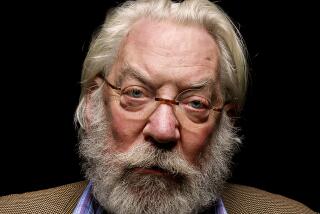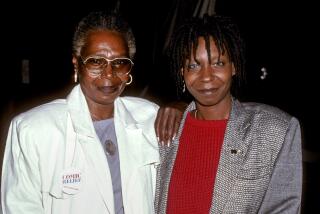The Method to Their Business
- Share via
When David Lee Strasberg was a boy, his parents asked him and his brother to sweep the floors at the family-run theater and acting school in West Hollywood. But then someone--probably one of their parents’ friends “who wanted to make nice with the Strasberg kids,” recalled the now-grown Strasberg--pointed out that people known as janitors were paid money for sweeping floors.
So the Strasberg boys asked to be paid too.
Well, said their parents, first you’ll have to fill out job applications.
The boys did, and they got the job. Strasberg doesn’t remember now how much he was paid. But he felt as if he had joined organized labor, he said.
That’s a lesson some might have expected, considering that his father was Lee Strasberg, co-founder of the legendary Group Theatre, which produced such pro-labor efforts as “Waiting for Lefty” in the ‘30s. However, Lee Strasberg was hardly an advocate for “Lefty” within Group Theatre circles, historians have reported.
A more pertinent lesson for the young Strasberg was that theatrical work doesn’t necessarily involve acting or directing or writing. This conclusion didn’t immediately sink in, he said, but “things really do come full circle.”
Although he is not an actor, a director or a writer, David Lee Strasberg, now 29, is the chief executive officer of the acting school his father started, the Lee Strasberg Creative Center. Recently, he launched a new theater company at the Marilyn Monroe Theatre at the center’s West Hollywood branch--the same place where he once swept the floors.
The company is called the Group at Strasberg, in conscious homage to the earlier Group, although on paper the two Groups don’t look very similar. The first one was an ensemble, known for work with a distinct political perspective. The current Group is not an ensemble, and its first season of three plays is eclectic, with no apparent political bent.
The initial production, Craig Wright’s “Molly’s Delicious,” which opened Oct. 27, is a small-town play in which “everyone is charming,” Strasberg said. It will be followed in March by the premiere of Kate Robin’s “Stigmata and Other Symptoms,” about a teenager with an eating disorder who battles with her father and sees eccentric visions of Jesus, Mary and the saints. The final play, in May, John Mighton’s “Possible Worlds,” follows two detectives “through inner and outer space, tracking down a serial killer,” according to the Group’s season announcement.
Strasberg acknowledged differences between the two Groups. But he said they share the intent of “bonding people together with the aim of creating new work, in an environment where everyone makes a contribution, including the audience.”
Of course, Lee Strasberg is less famous for his work with the Group Theatre than he is for synthesizing the Method, the famous program of training actors that dominated mid-century American acting. Although he wasn’t one of the founders of New York’s Actors Studio, which was the fountainhead of the Method, he joined it soon after it was established. In 1951, he was named its artistic director, and he remained the dominant figure at the Actors Studio until he died in 1982.
The Lee Strasberg Creative Centers--in West Hollywood, New York and, for a 10-year period, in London--were designed as a way to make Method training more accessible than it is at the highly selective Actors Studio. Students “can come in thoroughly untrained,” said David Lee Strasberg, although many of the students do have considerable training elsewhere. “The main criterion is their level of commitment.”
*
The younger Strasberg’s own training in the Method was spotty, and for many years he didn’t have a strong commitment to the theater. It wasn’t because of lack of access. As a child, he often observed his father conducting sessions after school, and his home life featured appearances by the likes of Dustin Hoffman and Al Pacino. His third birthday party was on the Dominican Republic set of “The Godfather Part II” in which his father was acting--his primary memory of the event was of a guitar-shaped birthday cake. Through the fifth grade, he attended the United Nations International School in New York, where he was given the flexibility of traveling with his parents to distant countries, where his father was lecturing.
When he was 11, Strasberg and his older brother Adam portrayed brothers in “My Prince, My King” at the Actors Studio. In the play, the characters’ father has a heart attack. Strasberg remembers that his performance wasn’t very good, and there was one mildly traumatic moment when an artificial branch of a Christmas tree failed to budge as planned. But a much greater trauma soon followed: During the run of the play, Lee Strasberg died, at the age of 80. David Strasberg was “decimated,” he said, though he also remembered that performances of the play went on even after his father died.
As a teenager, Strasberg took a couple of summers of training in the Method, although his father had maintained that most people that age are not ready for it. Some of the concentration exercises, he said, seemed age-appropriate, and he took pride in being able to master an exercise in which he thought about summer sunshine and started sweating on command. Generally, however, the training “was not a piece of cake,” he said.
A few years later, he ran the lights and sound for a production of “A View From the Bridge” at the West Hollywood center. But when he went to Brown University in Rhode Island, he strayed from the theatrical life. He majored in international relations and modern American history, then went on to obtain an MBA from UCLA.
His mother, Anna, who is the artistic director of the Creative Centers, gave him no grief about this. “I was so pleased that my sons weren’t taking a ride on their father’s name,” she said. “They wanted to know who they were in their own skins.”
“I was following my passion,” Strasberg said. He followed it into the political arena, working in Washington for the Small Business Administration in 1993 and then moving to Los Angeles to work for Mayor Richard Riordan for more than five years.
In another example of how his life has come full circle, he found himself attending mayoral social events at the city-owned Getty House, the mayor’s official residence in Hancock Park. This had once been his own home, when he was 4 years old. When Strasberg left the Riordan administration last year, he was a senior policy and budget analyst.
During most of his early adulthood, Strasberg saw no life for himself in the theater. But last year, he began discussing with his mother whether there might be a way to work in the family business without acting or directing. “I said, ‘Yeah, take my job,’ ” Anna Strasberg recalled with a laugh.
Although he didn’t quite take his mother’s job, David Lee Strasberg believes he has found a way to combine “two things I like: building communities of people and maintaining my parents’ legacy.” His business school training “showed me an approach to solving creative problems” that may arise on his new job, he said, and, likewise, he thinks his father’s Method could teach businesspeople a thing or two.
His mother isn’t quite certain that he ever left the theater--”Do you think politics isn’t theater?”
Asked where the money is coming from for the Group at Strasberg, Anna Strasberg replied: “From me, from Mama.” She has experience administering money, as her late husband’s estate includes three-fourths of Marilyn Monroe’s estate; the movie star was a student of Lee Strasberg. But Anna said the Monroe money--when it isn’t used to fight legal battles over the unauthorized use of Monroe’s name--goes to charities that she knows Monroe would have approved. It’s not going into the new theater company.
Anna Strasberg read the scripts that her son picked for his company’s season, but “I don’t judge them on whether I like them,” she said. One of them, especially, “I didn’t understand,” she said, though she won’t say which one. However, she respects her son’s opinion that these playwrights are “voices who need to be heard.”
“He’s the boss,” she said, pausing only briefly before adding: “But I’m his mother.”
--- UNPUBLISHED NOTE ---
According to the mayor’s office, Getty House, the official residence of the L.A. mayor, is located in Windsor Square, not Hancock Park.
--- END NOTE ---
More to Read
The biggest entertainment stories
Get our big stories about Hollywood, film, television, music, arts, culture and more right in your inbox as soon as they publish.
You may occasionally receive promotional content from the Los Angeles Times.










